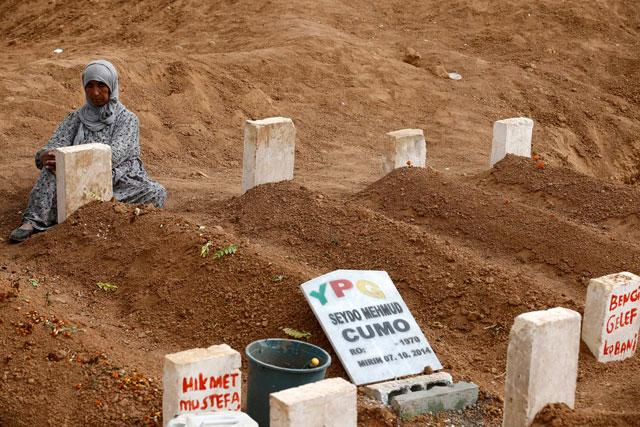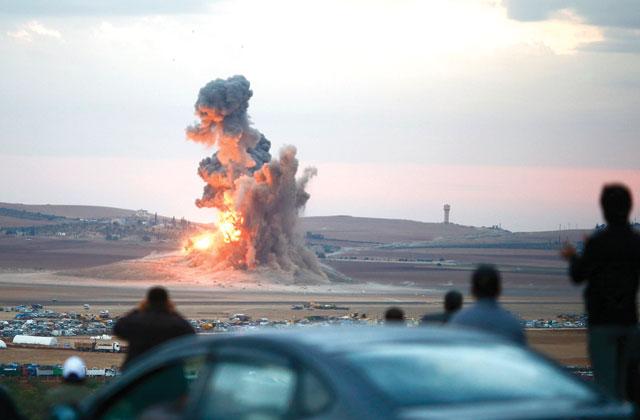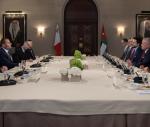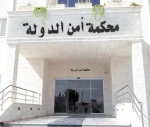You are here
No new deal with US on using airbase — Turkey
By AP - Oct 13,2014 - Last updated at Oct 13,2014
ANKARA — Turkey's foreign minister insisted Monday there was no new agreement with the United States on using Turkish bases for operations against the IS (IS) militants.
In comments carried by the state-run Anadolu Agency, Foreign Minister Mevlut Cavusoglu said, however, that the two countries had agreed to train and equip opposition forces.
"There is no decision at the moment concerning Incirlik or any other issue," Anadolu quoted Cavusoglu as saying in reference to a key airbase in southern Turkey.
Earlier, a government official said Turkey and the United States were still talking about the Incirlik airbase as well as Turkish demands for the creation of a no-fly zone and a safe haven for refugees. The official spoke on condition of anonymity because he was not authorised to speak on the issue publicly.
On Sunday, US defence officials said Turkey would let US and coalition forces use its bases for operations against IS militants.
IS extremists have carved out a vast stretch of territory from northern Syria to the outskirts of Baghdad and imposed a harsh version of Islamic rule. The fighters have massacred hundreds of captured Iraqi and Syrian soldiers, terrorised religious minorities, and beheaded two American journalists and two British aid workers. Hundreds of thousands of refugees have fled into Turkey from Syria ahead of the militants.
A US-led coalition has been carrying out air strikes against the militant targets in and around the Syrian border town of Kobani for more than two weeks. The town's fate has emerged as a major test of whether the air campaign can roll back the extremists in Syria.
Turkish Prime Minister Ahmet Davutoglu, in comments published Sunday in the Milliyet newspaper, said the Incirlik airbase was already being used for reconnaissance purposes in Iraq, but suggested its use for wider operations would depend on whether Turkey's demands for a no-fly zone and a safe zone in Syria are met.
"There are activities that we are already undertaking jointly from Incirlik, concerning Iraq: the Predators, the reconnaissance flights can continue," Davutoglu told Milliyet, referring to unnamed aerial vehicles.
"But as a base for a more extensive operation — if they are expecting the contribution of any country — we have already made our position clear: there has to be a no-fly zone and a safe haven must be declared," he said.
On the ground Monday, a suicide bomber from the IS group detonated his explosive-laden vehicle in Kobani amid fierce fighting with Kurdish militiamen there.
The sound of explosions and occasional gunfire could be heard across the border from Kobani a day after Kurdish fighters managed to slow the advance of the jihadist group. What appeared to be a rocket-propelled grenade struck a minaret in the centre of the town, emitting a cloud of white smoke.
Activists said IS militants were carrying out a three-pronged attack from the eastern side of the town and that clashes were reported in the southern part.
The Syrian Kurdish enclave has been the scene of heavy fighting since late last month, with the better-armed IS fighters determined to capture the border post.
The Britain-based Syrian Observatory for Human Rights said an IS suicide bomber detonated a car filled with explosives Monday in the northern part of Kobani near the border with Turkey. It said the car was headed to the border crossing between Kobani and Turkey.
Later Monday, another suicide attacker blew himself up in a vehicle east of Kobani near the security quarter that houses the main police station and other local government offices, according to the observatory and Kobani-based activist Farhad Shami.
Shami said the first vehicle appeared to have exploded prematurely. There was no immediate word on casualties from either explosion.
Shami said coalition aircraft flying over Kobani had struck 10 times Sunday and Monday.
Related Articles
Turkish President Recep Tayyip Erdogan has said his country opposes the idea of a Kurdish-controlled autonomous government in northern Syria.
The Obama administration is boxed in by its promise to limit US military engagement against Islamic State (IS) group extremists, making it tough to agree to Turkey's condition for joining the fight in neighbouring Syria.
The US decision to airdrop weapons to Kurdish forces in Syria on the same day Turkish President Recep Tayyip Erdogan dismissed them as terrorists is the latest false note in the increasingly discordant mood music coming out of Washington and Ankara.

















